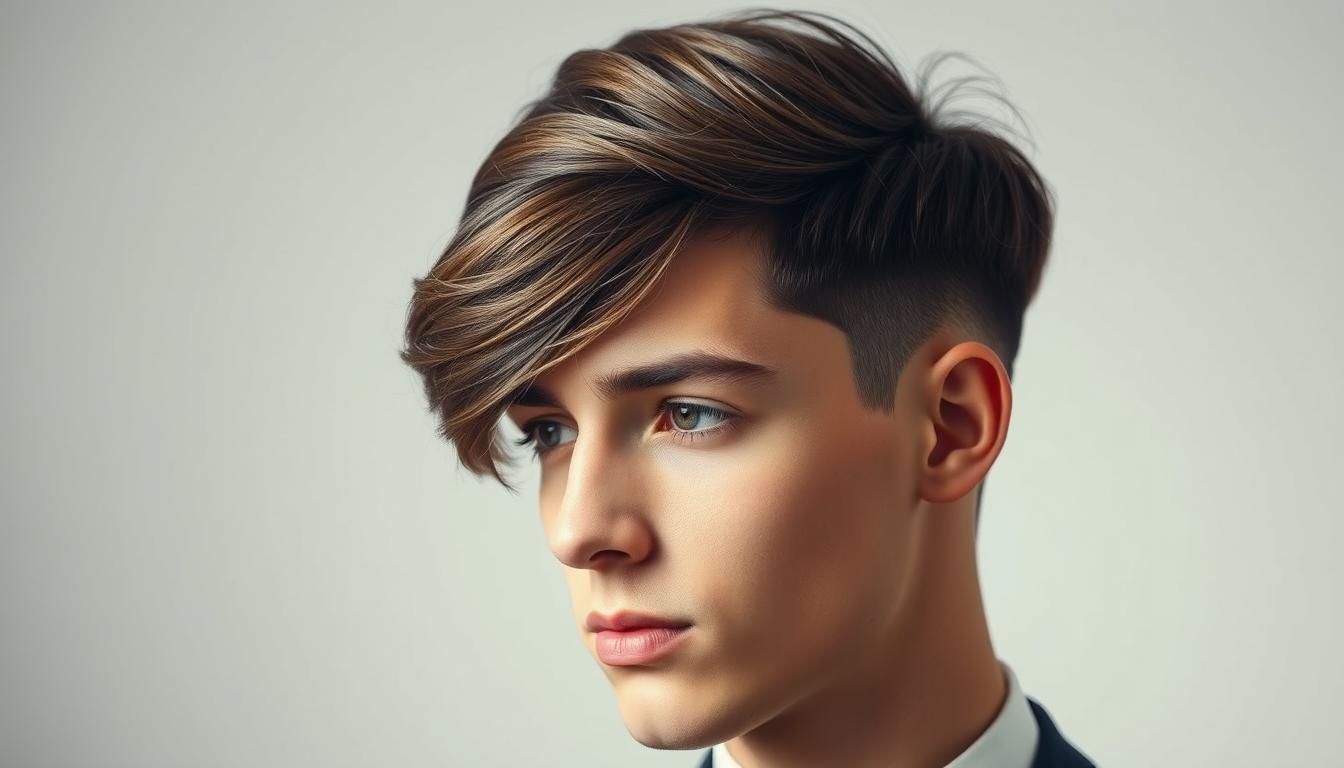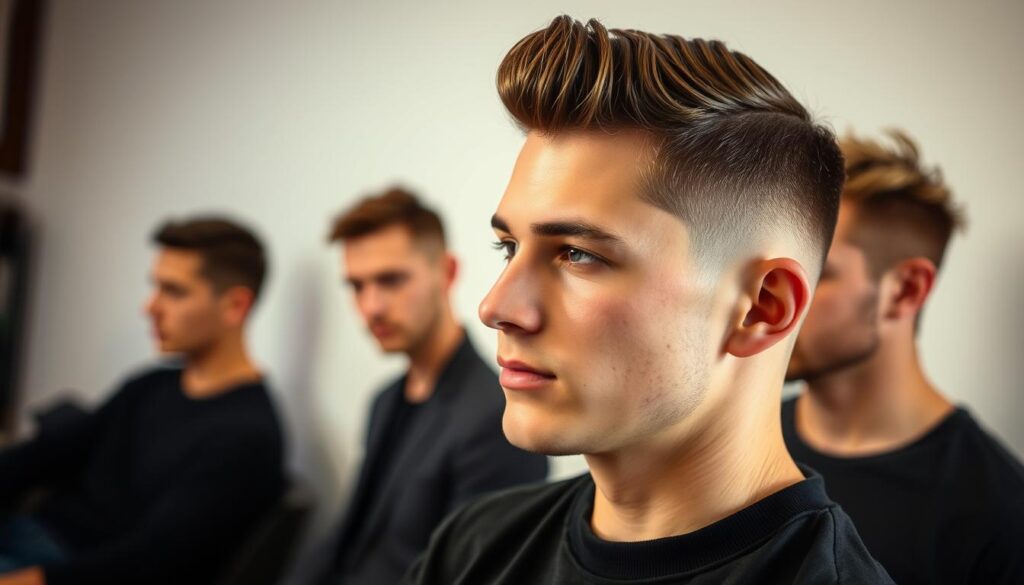
What if one hairstyle could effortlessly adapt to both casual mornings and formal evenings? The answer lies in a timeless cut that’s dominated red carpets and city streets for generations – yet remains refreshingly simple to maintain.
This iconic crop blends texture with clean lines, creating a look that’s sharp without appearing overly styled. Whether your hair is straight or slightly wavy, its layered structure adds natural volume while keeping maintenance minimal. No wonder it’s become a go-to for men seeking sophistication without daily fuss.
Beyond aesthetics, the style’s versatility shines. Pair it with a crisp suit for boardroom-ready polish or let it air-dry for weekend ease. The secret? A balanced blend of shorter sides and textured top layers that frame the face without demanding constant attention.
Key Takeaways
- Combines timeless appeal with modern adaptability
- Works for straight, wavy, and thick hair types
- Requires minimal daily styling effort
- Enhances facial features through strategic layering
- Transitions seamlessly between casual and formal settings
Understanding the French Top Haircut

Men’s grooming trends come and go, but some designs reinvent themselves while keeping core principles intact. At its core, this versatile cut combines textured length above with sharply tapered sides—a formula that’s evolved from classic barbering into modern style essential.
The Evolution From Classic to Contemporary
Originally popularized as the French crop, this hairstyle emphasized a clean contrast between cropped sides and fuller lengths on the crown. Today’s version adds subtle updates: softer fades replace harsh lines, while textured layers create movement. “It’s about balancing structure with adaptability,” explains veteran barber Marcus Lee. “Clients want polished looks that survive busy mornings.”
Why Effortless Style Wins
The magic lies in strategic proportions. Longer hair on top adds height for oval or round faces, while faded sides streamline wider jawlines. This low-maintenance approach works because:
- Natural texture requires minimal product
- Monthly trims maintain sharp edges
- Optional fringe adapts to cowlicks or hairlines
Whether your strands are pin-straight or loosely curled, the design enhances what you’ve got. Thick hair gains definition through layered cutting, while finer types benefit from added volume at the crown. It’s style without the struggle—exactly what modern grooming demands.
Top Trends for the French Top Haircut

Barbershops are buzzing with fresh takes on a classic design. The latest updates blend heritage techniques with modern edge, offering endless ways to customize your signature look. From office-ready polish to weekend texture, these variations prove why this crop remains a barber favorite.
Classic & Traditional French Crop Styles
The original version keeps things clean. {{the}} sides contrast with a longer crown, while the fringe sweeps forward for subtle coverage. This timeless approach works best with straight or slightly wavy hair types. Monthly trims maintain crisp lines without sacrificing natural movement.
Modern Disconnected and Textured Variations
Want sharper contrast? Try a disconnected version with skin-faded sides and 3-4 inches on top. A razor-sharp partline adds drama between lengths. For added dimension, barbers use point-cutting to create piece-y texture. Some clients opt for sun-kissed tips to emphasize the layered effect.
Bold Fades and Undercut Combinations
Fade enthusiasts have options:
| Fade Type | Length on Top | Best For | Maintenance |
|---|---|---|---|
| High Fade | 2-3 inches | Angular faces | Bi-weekly touch-ups |
| Low Fade | 3-4 inches | Round shapes | Monthly trims |
| Undercut | 4+ inches | Thick hair | Every 6 weeks |
Pair these fades with a textured crop for urban edge. The undercut version lets you experiment with slicked-back styles or casual tousled looks. Your barber can adjust proportions based on your hair density and face shape.
Expert Styling Tips to Perfect Your Look
Your morning routine just got smarter. With the right tools and techniques, you can transform your cut from basic to brilliant in minutes. Let’s break down the essentials for creating head-turning styles that last all day.
Choosing the Right Hair Products for Your Hair Type
Match your styling products to your hair’s natural behavior. Fine strands thrive with lightweight sprays, while thicker textures need stronger holds. Consider this cheat sheet:
| Hair Type | Best Product | Pro Tip |
|---|---|---|
| Straight | Matte paste | Adds grip without shine |
| Wavy | Sea salt spray | Enhances natural bends |
| Curly | Curl cream | Defines without crunch |
| Thick | Strong-hold gel | Tames flyaways |
Blow-dry damp hair upward with a round brush to build volume at the roots. For straight hair styles, finish with a flat iron using heat protectant spray. Always apply products to towel-dried strands for even distribution.
Effortless Techniques for a Refined, Windblown Finish
Create that “just stepped off a yacht” look in three steps:
- Rough-dry your fringe with fingers until 80% dry
- Spritz texture spray at the top layers
- Flip your head upside down, blast with cool air for 10 seconds
This method adds texture and movement without sticky residues. For extra polish, use a dime-sized amount of wax to sculpt individual strands. Remember: less product means more natural-looking results.
Inspirational Looks and Men’s Haircut Variations
Red carpets and barber chairs alike are buzzing with reinvented classics that redefine modern masculinity. From Hollywood icons to your neighborhood stylist, creative minds keep this signature crop endlessly fresh. Discover how to make it your own through celebrity-approved updates and barber innovations.
Celebrity-Inspired French Crop Trends
Timothée Chalamet’s textured fringe and Chris Hemsworth’s sun-kissed layers prove stars love this versatile cut. Their stylists often leave extra length up front for dramatic sweeps or casual tousles. Zayn Malik’s disconnected version pairs a skin fade with 4-inch waves on the crown – perfect for men wanting bold contrast.
Fresh Takes from Modern Barbershops
Leading stylists now blend classic shapes with unexpected details. Try a curly variation with tight coils brushed forward, or a “Caesar cut” update using razor-sharp lines. For longer hair lovers, some barbers keep 5 inches on the hair top while tapering the back to skin level.
| Style | Key Feature | Maintenance |
|---|---|---|
| Disconnected Crop | Bold fade contrast | 3-week trims |
| Blonde Textured | Balayage highlights | Monthly touch-ups |
| Side-Swept | Angled fringe | Daily wax application |
These styles work across hair types. Thin strands gain fullness with shorter crop cuts, while thick manes shine in messy variations. Want edge? Ask your barber for a hard part line or geometric fringe. The options mirror today’s men – diverse, dynamic, and decidedly individual.
Maintenance and Care for a Clean French Crop
Keeping your crop looking crisp requires smart habits between salon visits. While this cut thrives on simplicity, strategic upkeep preserves its sharp lines and balanced proportions. Let’s explore how to maintain that freshly-barbered appearance day after day.
Essential Grooming Routines and Regular Barber Visits
Book appointments every 2-3 weeks to maintain precise fades and taper transitions. Your barber becomes your style partner – they’ll memorize your hairline shape and growth patterns for consistent results. Bring photos if adjusting length or trying new styles.
| Style Variation | Key Maintenance | Visit Frequency |
|---|---|---|
| Textured Crop | Layered trims | Every 14 days |
| Natural Look | Blunt edge cleanup | 21 days |
| Disconnected Fade | Skin fade refresh | 10-14 days |
Clean sides and back head areas first during showers to prevent product buildup. Use sulfate-free shampoo to preserve natural oils that add texture. For longer hair top styles, apply leave-in conditioner to prevent dryness.
Coordinate beard trims with haircuts for unified sharpness. A #2 guard works well for stubble that complements shorter crops. Check hairline edges daily – uneven growth around ears or neck signals it’s time for touch-ups.
Communicate clearly about part placement or bangs adjustments. Say: “Keep 2 inches on the crown” or “Soften the taper behind my ears.” This ensures your look evolves with your preferences while staying camera-ready.
Conclusion
When confidence meets practicality in men’s grooming, the results speak for themselves. The crop stands out as a universal solution that complements every face shape and hair type. Natural curls gain definition, straight strands acquire movement, and thick textures find balance – all through one adaptable cut.
Its magic lies in the strategic contrast between longer lengths up top and neatly trimmed sides and back. This creates visual height while maintaining a polished appearance that transitions from office meetings to weekend adventures. With minimal daily effort required, you’ll spend less time styling and more time feeling camera-ready.
Armed with knowledge about fade variations, product selection, and barber communication, you’re set to own this look. Whether opting for subtle texture or bold undercuts, regular trims preserve sharp lines without compromising adaptability. The true win? A style that evolves with trends while keeping its timeless core.
Invest in this cut once, and watch it pay dividends across every aspect of your life. From first impressions to lasting confidence, it’s the grooming equivalent of a perfectly tailored suit – always appropriate, endlessly versatile.
